Group doubts 20mph default speed limit has made Welsh roads safer
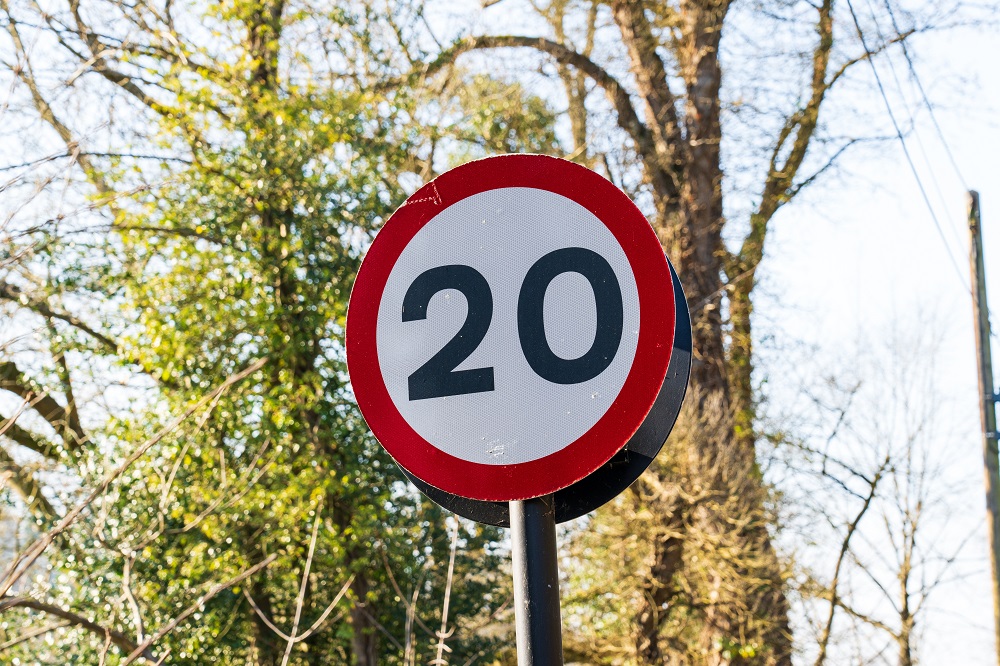
Martin Shipton
A group that opposes the default 20mph speed limit in Wales has sought to discredit claims that the change has made roads safer.
By the time it closed on March 13 2024, a petition calling for the lower limit to be rescinded had attracted 469,5710 signatures – by far the highest number ever achieved by a petition to the Senedd.
However, on June 12 BBC Wales reported that road casualty figures issued by the Welsh Government showed a 12% drop in the number of people killed and seriously injured at 20mph and 30mph for the last three months of 2023, compared with the same period in 2022.
But the group United Voices, set up in 2023 to monitor and protest against the impact of the 20mph legislation and hold the Welsh Government to account, claims the figures quoted by the BBC provide a distorted view of the situation.
Impact
David Jones, one of the group’s founders, said: “The statistics that have recently been released by the Welsh Government give the first opportunity to compare, like on like, the before and after impact of the legislation.
“While the BBC report was true as far as it went, there are other statistics that have been made available that paint a different picture.
“There has actually been an increase in the numbers of people who have either been killed or seriously injured on 20mph roads over the same period.
“The reduction in the numbers at 30mph may be due to the fact that there are now less roads restricted to 30mph, thus resulting in less accidents. It could therefore be argued that the problem overall has remained the same. And it could also be argued that the problem has moved from the 30mph roads to the 20mph roads. The question is, does this make 20mph roads less safe?
“Furthermore, while it appears that one category of road users may have seen some benefit to the implementation, looking at the data as a whole brings into question whether other categories of road users are now paying a hefty price.”
Graphs
Mr Jones cited a series of graphs issued by the Welsh Government that he claimed illustrated the group’s view that the change had not delivered the safety improvements predicted and claimed.
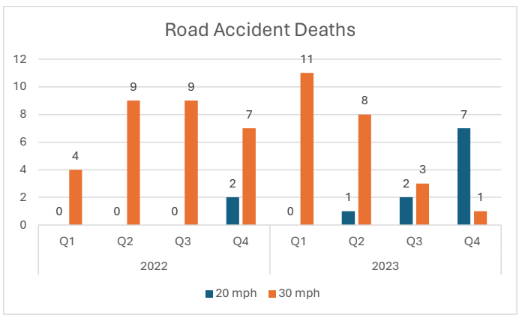
The default speed limit went down from 30mph to 20mph in September 2023. One graph illustrated the comparison between 2022 and 2023 on a quarterly basis, with deaths from road accidents at speeds of 20 mph and 30 mph. It showed there were two deaths in Q4 2022 at 20 mph, while this increased to seven deaths in Q4 2023 – an increase of 250%.
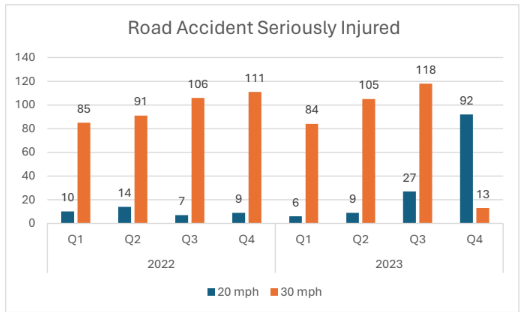
A second graph related to people who were seriously Injured in road accidents at speeds of 20 mph and 30 mph. The results showed there were nine people seriously injured in Q4 2022 at 20 mph, while this increased to 92 in Q4 2023, an increase of 922%.
Another graph illustrated the comparison between 2022 and 2023 on a quarterly basis of deaths and seriously injured motorcyclists. Since the introduction of the default speed limit, the number of motorcyclists who have died as a result of a road accident has increased from none in Q4 2022 to four in Q4 2023, an increase of 400%.
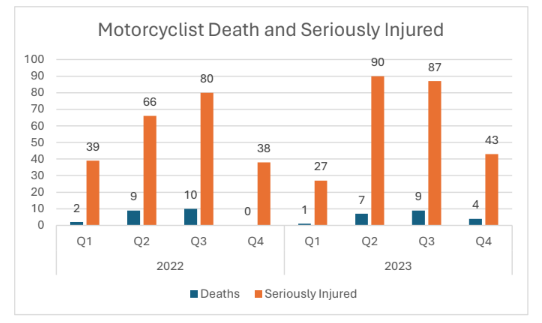
The number of seriously injured motorcyclists who have suffered serious injury due to a road accident rose from 38 in Q4 2022 to 43 in Q4 2023, an increase of 13%.
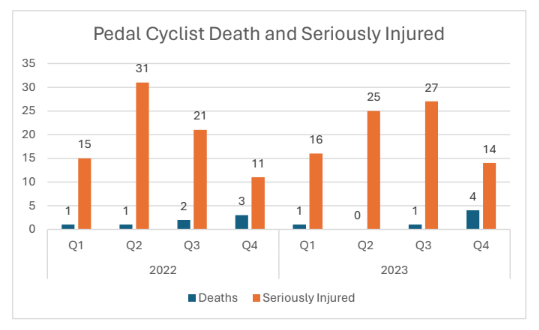
Since the introduction of the default speed limit changes last September, the number of cyclists who have died as a result of a road accident has increased from 3 in Q4 2022 to 4 in Q4 2023, an increase of 33%.
A further graph shows that over the same period, an increase in cyclists suffering serious injury due to a road accident rose from 11 in Q4 2022 to 14 in Q2023, an increase of 27%.
Mr Jones said: “Given the data available, the Welsh Government now needs to urgently review the aims of the policy and ensure that the benefits it claimed would be brought about through the reduction in speed have not inadvertently caused more dangerous roads elsewhere.
“Questions need to be answered as to whether the overall promised reduction in road casualties plus the promised savings to the NHS have materialised, given the increase in death and serious injury to other categories of road users.”
Support our Nation today
For the price of a cup of coffee a month you can help us create an independent, not-for-profit, national news service for the people of Wales, by the people of Wales.





Ah, United Voices, a group set up in London at Lexington st, London , why would this group have any interest in the laws of a different country? Just like the anti 20mph Facebook group, set up by a Sunderland, England, Tory councillor to attack a law in Cymru. Their views are about as relevant to us ,as a statement made by the Mongolian govt on laws in Cymru.
Gareth. I am the founder of united voices. I can assure you I’m Welsh and I live in Wales.
Science says the heavier the object plus the faster the speed the harder and more damaging the impact. That also goes for 2 ton cars going at higher speeds. Since the rollout of the default 20mph those opposed have been shouting (and they do a lot of that) for the evidence to back up the rollout and now surprise surprise when the evidence is produced they attack it. All very Trumpian.
I’m attacking nothing. I’m highlighting the fact that when you analyse the data provided by the police it leaves very big questions.
Well people need to actually do 20 frist, it ain’t happening often. But I find the figures recently published to be more realistic than the voices of people who are foreign.
Traffic seems to be moving at the same speed as it always did in built up areas.
I’ve even noticed buses and council vehicles driving nearer to 30mph than 20.
Karl’s point is the major point here however. We can either have people driving at 20 mph in residential and built up areas, or we can have similar, if not higher numbers of road deaths in these areas. We can no have both.
Either we buy in to the idea as a nation and see what happens, or we ignore it and the killed and seriously injured numbers stay the same.
Not everyone who disagrees with you is ‘foreign’.
Who are “ people “. ? One life saved is enough for me ! Someone’s child, Someone’s brother , Someone’s mother ?
Difficult to quantify near misses as these are non-incidents by definition. However, I have had three youngsters jump out in front of me in as many weeks. I shudder to think what would have happened if I had been exceeding 20. That’s sufficient evidence for me.
Who gets to choose which life is more worthy of saving?
Do you happen to know that the biggest cause of death for Welsh children isn’t from being mowed down by cars? The office of national statistics state it’s chromosomal abnormalities. Are their lives not worth saving?
‘By the time it closed on March 13 2024, a petition calling for the lower limit to be rescinded had attracted 469,5710 signatures – by far the highest number ever achieved by a petition to the Senedd.’ I’m not clear – because thus far I’ve not been able to come across the information – whether these ‘469,5710 signatures’ have come from people who live in Wales, or who at the very least travel to Wales frequently for business and/or for pleasure, or whether they’ve been gathered, UK-wide and purely polemically, from people who live many miles away and who may… Read more »
People had to put their postcode in when registering their signatures. Of course, this could mean people outside Wales could have looked up a Welsh postcode and used this instead. It’s a fundemental flaw in the petitions system calling into question the result of every petition put before the Welsh Parliament.
Thank you for that useful clarification. I agree entirely with the conclusion which you draw from the way that the petition system appears to operate.
Thank you.
The same flaw would also apply to the uk parliament’s petition website.
Reports at the time suggested it was signed from around the world including Vatican City. Now I’m not saying the Pope himself was a signatory but who knows if he’s still angry about Henry.
I like it!
Henry Ford?
The end figure would have been reached after the petitions committee would have run all their usual checks.
The end figure was after the petitions committee did all their usual checks. So all duplicates etc would have been removed.
Here’s hoping.
Who are these people ? Who elected them and what is their mandate ? What connects them ? Are they linked to the sign 🪧 painters ?
We should be told ! Now
I m the group founder member. No one elected me, but a growing number support me.
The police figures published 6 June appear to have been all casualties, not just the deaths and serious injuries. Perhaps NC could clarify that? Why there should be a different picture from the two sets of data is another question. It could be the same cohort of dangerous drivers that caused the serious accidents in the past have continued to drive in the same manner, if not worse, raising the serious collision numbers. My personal experience is that dangerous tailgating has increased within all speed limits, not just the 20 zones. The growing number of electric cars will also affect… Read more »
The data used in my analysis comes from the police data, and looks specifically at serious injuries and deaths. All categories are listed on the original police doc. It can be found on the WG website.
Your analysis also shows that the overall number of incidents (both KSI and slightly injured) for Q4 has decreased slightly, showing that lowering the default speed limit from 30 mph to 20 mph has saved at least one life and six serious injuries.
These people will try anything to discredit something to the point of delusions
You know, there was a Japanese guy that kept fighting for 20 years after WW2 ended, even though people were trying to telling him the war had ended, I guess these people are similar, they bought into their stance and they ain’t giving up and admitting defeat 🤣🤣
The figures used were police data. Are you saying that the police are not a credible source of accident data?
I think what he’s trying to say is that the information has been skewed to align with one agenda, that being that “Killed and Serious Injury” incidents (KSI’s) have increased on 20 mph roads, when in actual fact, they have dropped overall.
Guaranteed you will not find one cyclist, in Wales or anywhere, who would rather speed limits be increased from 20mph to 30mph. Why? Because slower vehicle speeds improve safety for vulnerable road users.
One a couple of roads near my home the biggest offenders at speeds over 20 are the lycra clad buffoons ! Are they exempt or something ?
Yes, they are exempt.
Cyclists are not subject to speed limits for motor vehicles.
If a vehicle is not a “motor” vehicle, it does not need to abide by the same speed limits.
Who really gets offended when a cyclists drives over 20mph?
Can a cyclists kill someone with a bike? Yes. Is it likely? Not at all
Can a driver kill someone with a car? Yes. Is it likely? Orders of magnitude more likely, especially at higher speeds and mostly involving more casualties.
What we really need is the intergrated road systems with dedicated bike lanes on all roads, as in Europe, to help with safety.
Insurance claims will likely be the final arbiter. Esure recently said there was a 20% decrease in claims and if other firms in future confirm this then it will be difficult to dispute that it made the roads safer.
Casualty figures may well have a more random nature to them but a few years worth of statistic should enable any trend to be discerned without argument. They also do not tell you the cause, deaths and injuries can be caused by drivers being impaired by drugs and alcohol and then speeding in addition.
I would say although its difficult to manage at times, on a recent tour of ‘Canolbarth Cymru’, I definitely saw a lot more elderly local residents, getting about their villages with more confidence as a result. Also, ‘trefi fel Corwen’ need to slow the traffic down so potential visitors can safely stop and shop in the town in order for it to revive.👍🏴
vehicle damage claims have reduced by 20% since the default 20mph speed limit was introduced in Wales. Esure says claims have dropped at a time when they typically rise. This contrasts with England, where the company did not see a similar drop in claims
If an insurance company is saying it, it must be working!
Why all the lies about who can change the 20mph speed limit zones council or the sennedd? Fact the council’s cannot reset any of the 20mph speed limit zones unless they qualify the mandate set down by the sennedd! Within the mandate are a number of hurdles each reset road must qualify. Without passing the hurdle the speed limit remains at 20mph. Otherwise without doubt these speed limits would have been strongly opposed in the localities. Putting out disinformation to exonerate a flawed policy is beneath any political party???
Why don’t you know how to spell and capitalise the word Senedd?
So if slower vehicles are less safe with they be calling for a fifty minimum limit outside schools and retirement homes?
I read a recent report saying that the number and value of insurance claims has gone down since the 20mph limit came in.
While I don’t see our Norman occupied fellow Britons as foreign (they’ve just had the culture crushed harder than ours) I do agree that as it doesn’t apply in England they have no business interfering.
Just a passing thought on the statistics. The road past our house used to have speed limit signs due to the nearby schools. Those were torn down with the introduction of the new Urban Speed limit and traffic speeds shot up and have remained high. Go Safe, when challenged on the the lack of enforcement, suggested that there was no need for enforcement or repeater signs since the road is lit and “verybody knows that a lit street has a 20mph speed limit”. So if our bit of road is in any way typical it would be no surprise that… Read more »
Is this group comparing like for like?
The number of people injured, or killed, in 20mph would obviously increase since the amount of 20mph roads have increased. What is the figure per mile of 20mph road?
Given the fact that the default speed limit changed from 30 mph to 20 mph in September, it is nessicary to re-evaluate the data in this new context. This policy change would have shifted many roads from the 30 mph category to the 20 mph category. The large increase in incidents (both KSI and slightly injured) in the 20 mph category can be attributed to the reclassification of many roads from 30 mph to 20 mph. Conversely, the significant decrease in the 30 mph category incidents indicates that the roads previously under this limit now fall under the 20 mph… Read more »
In case anyone was confused about what I meant by: “Interestingly however, the decrease in overall incidents (both KSI and slightly injured) for Q4 suggests that lowering the default speed limit from 30 mph to 20 mph has had a positive impact on road safety.” Siting the first graph labeled “Road accident deaths”, if you count the deaths in Q4 2022, there are 2 on 20mph roads, and 7 on 30mph roads, totalling 9 deaths overall. If you count the deaths in Q4 2023, there are 7 on 20mph roads, and 1 on 30mph roads, totalling 8 deaths overall. The… Read more »
The point is that there is no where near the lives saved and related NHS cost saving, as we have been told repeatedly we would have.
You might find looking at the figures for other road users and other speeds and see what’s happened there.
Annette, with all due respect, I understand your point about deaths and serious injuries and savings to the NHS we were promised, but these results will not emerge overnight. Either we buy into the change and see these benefits emerge, or we see the same amount of death and serious injuries on our road.
Would you please let me know where to find the figures for other road users and other speeds you’ve mentioned? I’d really appreciate it. Thank you.